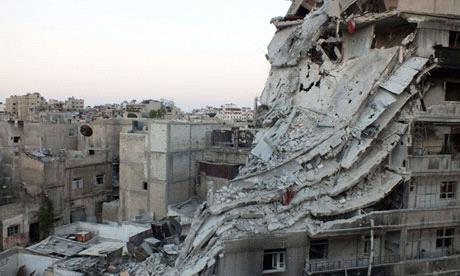Ammon News - (Reuters) -
An influential Islamist cleric turned rebel commander urged Syrian insurgents on July 10 to focus their war on President Bashar al-Assad’s Alawite heartland to a “balance of terror” and help turn the tide of the conflict.
After seizing large tracts of Syria’s north and east and parts of the center, the rebels - short of heavy weaponry – have struggled to weaken Assad’s grip over most major cities and his western Alawite communal stronghold along the Mediterranean coast that so far has been largely unscathed by the civil war.
“One has to concentrate on their strongholds and on their dwellings and their infrastructure. If (Alawites) continue living as they’re doing in peace and safety while wedded to the regime they will not be affected. They will not think of abandoning Assad,” said Islamist Sheikh Anas Ayrout.
He led anti-Assad street demonstrations in the coastal city of Banias early on in the conflict before forming one of the most influential and powerful rebel brigades.
Ayrout’s rebels are part of the Islamic Syrian Liberation Front, an umbrella group comprising several of the most formidable formations, with thousands of fighters. Ayrout is also a member of the opposition Syrian National Coalition.
The uprising led by Syria’s Sunni Muslim majority is increasingly rallying around Islamist appeals. This has heightened fear among Alawites, whose faith derives from Shiite Islam and who comprise about 12 percent of the population, and other minorities of a radical Sunni ascendancy in which hostile Qaeda-affiliated groups would hold sway.
“(Alawites) are relaxed while areas that have slipped out of regime control are always under shelling (by government forces), always in pain,” Ayrout said, referring to mainly Sunni areas of the north, center and east of the country. “If you do not a balance of terror, the battle will not be decided.”
Over 100,000 people have died in Syria’s two-year conflict. It began because Assad’s forces fired live ammunition at pro-democracy demonstrations, provoking an armed insurrection.
Slide into sectarian war
Alawites became identified with irregular “shabbiha” militia unleashed against anti-Assad protesters earlier in the uprising and later with elite army forces bombarding Sunni areas, leading many Alawites to fear bloody reprisals if Assad is toppled.
While Alawite figures in the opposition have called on the community to sever links with Assad, they say Alawites must not be targeted on the basis of presumed communal loyalty.
But sectarian attacks on civilians are now common and entire villages of Sunnis and Alawites have been emptied by fighters.
Ayrout acknowledged that rebels operating in Jabal al-Akradand Jabal al-Turkman, two mountainous regions that overlook the coast and are under constant army shelling, had ejected Alawite inhabitants from several local villages.
“We have to drive them out of their homes like they drove us out. They have to feel pain like we feel pain,” Ayrout told Reuters by telephone from Istanbul, where he attended a meeting of the opposition National Coalition, of which he is a member.
The insurgency against four decades of family rule by Assad and his late father has become the bloodiest of the Arab Spring revolt against autocratic elites common across the region.
While thousands of Alawite militiamen and troops have been killed, the majority of civilians killed have been Sunnis, according to opposition monitoring groups tracking the violence.
“We do not favor a sectarian war. But they brought it upon themselves,” said Ayrout, an ultra-conservative Salafist whose father was a well-known Sufi Muslim preacher in Syria.
“They preferred to side with Bashar and large numbers among them are now responsible for the destruction and the killings. They will have to face trial and justice if they want to continue living with us.”
Alawites have dominated Syria’s power structure through their control of the army and security apparatus for decades.
During the 1970-2000 rule of Hafez al-Assad, many Alawites moved to cities and towns in the hitherto mostly Sunni coastal region from the nearby Alawite Mountains, drawn by jobs in the army, security services and government.
Alawites now make up a significant part of the coastal population. The two main ports, Latakia and Tartous, serve as conduits for Russian weapons deliveries to Assad’s forces.
